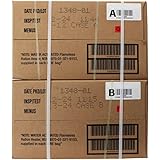Increased Vulnerability to Threats
Understanding Vulnerability
Let me tell you, if you’re not ready for emergencies, you’re basically opening the door wide for trouble. Vulnerability isn’t just about physical safety; it’s about emotional and mental preparedness too. You’re putting yourself and your loved ones in a spot where a simple emergency might spiral out of control because of a lack of planning.
Think about it—when a crisis hits, whether it’s a natural disaster, a sudden job loss, or even a health scare, not having a plan can leave you feeling lost. It’s like navigating through a thick fog without a map or a light. You can’t see what’s ahead, and you may just stumble into more issues.
That sense of vulnerability can lead to panic. And when you panic, decision-making goes out the window. Trust me, I’ve been there; I once found myself completely unprepared during a storm. It was a wake-up call to how important it is to have clear plans in place.
Financial Strain
The Cost of Not Being Prepared
Now, let’s talk money. Not preparing for emergencies often means a financial hit when things go south. You might think you’re saving by not setting aside an emergency fund, but it might cost you more in the long run. When you’re scrambling for resources, you could end up paying more for things because you weren’t ready.
For instance, if a major appliance fails out of the blue, having a financial cushion allows you to absorb that cost without too much stress. If you’re not prepared, you may have to rely on high-interest loans or credit cards, which can spiral into a much bigger problem down the line.
I’ve seen friends go through this, and it’s tough watching them struggle. It’s like being on a treadmill—running hard but not getting anywhere. Without preparation, you’ll find it challenging to regain financial stability after an emergency.
Emotional and Mental Stress
The Pressure Pile-Up
Honestly, unpreparedness can take a real toll on your mental health. The stress that comes with dealing with unforeseen emergencies—whether it’s worrying about your safety, your loved ones, or your financial situation—can absolutely eat away at you. I’ve felt that weight, and it’s not fun.
Your mind is great at coming up with worst-case scenarios if you’re not prepared. Uncertainty breeds anxiety, and when emergencies hit unexpectedly, that’s when you feel the pressure like a ton of bricks. It’s overwhelming, and I’ve had my fair share of sleepless nights because of not being ready.
== > What if ... Get a FREE Subscription to PREPARE
Learning to cope with stress is much easier when you have a plan. When you prepare, you’re basically giving yourself a safety net. It’s like knowing that if you trip off the edge, there’s something soft waiting for you, rather than hitting hard ground.
Potential for Bad Decisions
Impulse Over Insight
Let’s get real here. Experiences in crisis mode often lead us to make impulse decisions rather than thoughtful ones. I’ve been in situations where stress made me act without thinking through the consequences, and man, did that turn out to be a bad idea!
Get Preparedness and Self-Reliance Tips. Subscribe Now!
When prepared, you can take a step back, assess the situation, and make choices that actually benefit you and your loved ones. But without preparation, you might rush into decisions that could make the situation worse. I often advise people to have a plan laid out beforehand so they can respond effectively in a crisis.
Your mind becomes clearer when you’re not under severe stress, allowing for more rational, less emotional decision-making. So, why take that risk by being unprepared and potentially mishandling an emergency?
Disruption to Daily Life
The Ripple Effect
If your life gets thrown into disarray during an emergency, it doesn’t just stop there. The shockwaves ripple through your daily routine, affecting everything from work to family plans. Trust me, I know all too well how one little incident can snowball into complete chaos.
No preparation means your normal routines are upended. Whether you suddenly have to find alternative housing after a fire or coordinate emergency childcare, every unplanned change can lead to more headaches and complications.
Being prepared means you keep the continuity in your life as much as possible. Having nacho cheese in the pantry on a rainy day shouldn’t be your only plan! Preparing for emergencies should include strategies to maintain as much normalcy as possible for you and your loved ones.
FAQs
1. What should I do first to prepare for emergencies?
Start by creating a comprehensive plan that encompasses communication, meeting points, and a list of essential supplies you may need. It’s important to think through various scenarios and how to handle each.
2. How can I build an emergency fund?
Set aside a portion of your income regularly. Even if it’s just a small amount each month, it adds up over time and can help buffer the financial strain when emergencies arise.
3. What are some common types of emergencies to prepare for?
Common emergencies include natural disasters like floods or fires, personal emergencies like job losses, and health emergencies. It helps to have a plan tailored to each potential scenario.
4. How can I involve my family in emergency preparedness?
Communication is key! Discuss the importance and details of your emergency plan with all family members, run practice drills, and make sure everyone knows their role.
5. What resources are available for emergency preparedness?
There are many resources available including local community programs, online guides, and even government websites that offer checklists and tips for effective emergency planning.
Get Preparedness and Self-Reliance Tips. Subscribe Now!
Related Content
- The Ultimate Guide to Emergency Food Storage Tips for 2025
- What are the most effective strategies for self-reliant living?
- Why should I focus on mental preparedness for disasters?
- Prepping for Natural Disasters: Uncover the Secrets to Ultimate Preparedness and Resilience
- Affordable Ways to Start Emergency Stockpiling Today






